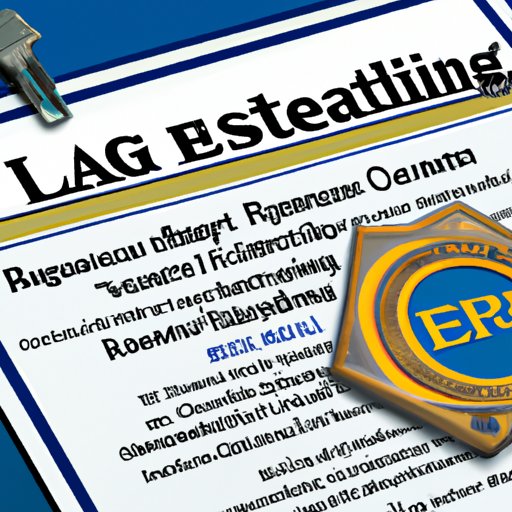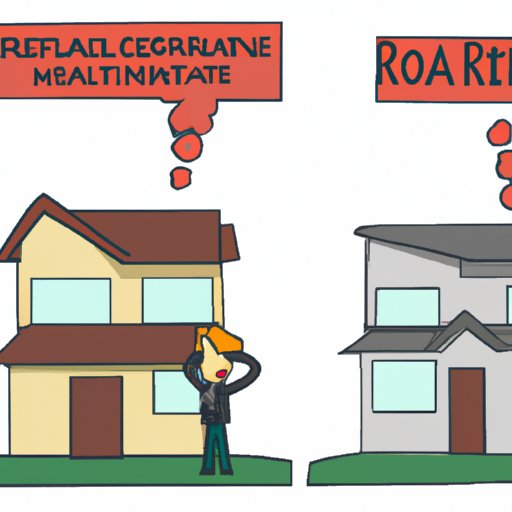Introduction
Real estate agents are professionals who help people buy, sell, or rent properties. They serve as intermediaries between buyers and sellers, helping to facilitate the transaction process. Becoming a real estate agent can be a rewarding career path, however there are specific steps that must be taken in order to become licensed and successful. In this article, we will discuss the steps, benefits, and best practices of becoming a real estate agent.
Steps to Becoming a Real Estate Agent
The first step to becoming a real estate agent is to determine the licensing requirements in your area. Each state has different requirements, so it’s important to research what is required before beginning the process. After obtaining the licensing requirements, you must complete the necessary education and training. This typically involves taking classes on real estate law, finance, and other topics related to the profession.
In addition to obtaining the necessary education and training, it’s important to develop the necessary skills to become a successful real estate agent. These include communication, negotiation, organization, and problem-solving skills. It’s also important to find a broker to work with. Brokers are experienced real estate agents who provide support and guidance to new agents.
Once you have obtained the necessary education and training, and developed the necessary skills, you must pass a state examination in order to become a licensed real estate agent. After passing the exam, you will officially become a real estate agent and can begin working.
Benefits of Being a Real Estate Agent
There are many benefits of being a real estate agent. One of the main benefits is the potential for financial gain. According to the Bureau of Labor Statistics, the median annual wage for real estate agents in 2019 was $50,300. There is also potential to make more money depending on the number of transactions completed.
Another benefit of being a real estate agent is flexibility. As a real estate agent, you are able to set your own hours and decide when and where you want to work. Additionally, there is potential for career growth within the field. As you gain experience, you have the potential to advance in your career and become a broker or open your own real estate business.

Licensing Requirements for Real Estate Agents
In order to become a real estate agent, you must meet certain licensing requirements. These requirements vary from state to state, but generally include some form of education and training, a background check, and an exam. The education and training requirement typically consists of taking classes on real estate law, finance, and other topics related to the profession. A background check is also generally required in order to ensure that applicants do not have any criminal convictions. Finally, applicants must pass a state-specific exam in order to become a licensed real estate agent.
Skills Necessary to Be a Successful Real Estate Agent
In addition to meeting the licensing requirements, it’s important to develop the necessary skills to be a successful real estate agent. These include strong communication skills, effective negotiation skills, the ability to stay organized, and problem-solving abilities. Communication skills are essential for interacting with clients, understanding their needs, and providing them with helpful information. Negotiation skills are also important for helping clients get the best deal possible. Organization is key for staying on top of paperwork, contracts, and other tasks involved in the transaction process. Finally, problem-solving skills are needed for resolving any issues that may arise during the transaction process.

Challenges Faced by Real Estate Agents
Being a real estate agent can be both rewarding and challenging. One of the main challenges faced by real estate agents is staying up-to-date with industry trends. This can be done by utilizing technology, attending conferences and networking events, and reading relevant publications. Another challenge is managing clients. This includes understanding clients’ needs, communicating effectively, negotiating deals, and completing contracts. Finally, real estate agents must also handle transactions, which involves processing paperwork, resolving any issues, and ensuring all parties involved are satisfied with the outcome.

Best Practices for Managing Clients and Transactions
In order to successfully manage clients and transactions, it’s important to understand clients’ needs, communicate effectively, negotiate deals, and complete contracts. It’s also important to stay organized and keep track of paperwork and other tasks involved in the transaction process. Additionally, it’s important to remain professional at all times and provide excellent customer service. Finally, it’s important to stay up-to-date with industry trends in order to remain competitive.
Tips for Staying Up-to-Date with Industry Trends
Staying up-to-date with industry trends is essential for real estate agents. One way to do this is to utilize technology, such as social media and websites, to stay informed. Additionally, attending conferences and networking events can be a great way to learn about current trends and connect with other professionals in the field. Reading relevant publications, such as trade magazines and newspapers, is also a great way to stay informed about the latest industry news.
Conclusion
Becoming a real estate agent requires obtaining the necessary licensing, completing education and training, developing the right skills, and understanding the best practices for managing clients and transactions. It’s also important to stay up-to-date with industry trends in order to remain competitive. The rewards of being a real estate agent include financial gain, flexibility, and career growth potential. If you are interested in becoming a real estate agent, it’s important to research the licensing requirements in your area and take the necessary steps to become successful.
(Note: Is this article not meeting your expectations? Do you have knowledge or insights to share? Unlock new opportunities and expand your reach by joining our authors team. Click Registration to join us and share your expertise with our readers.)
